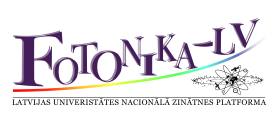The laboratories and observatories from the institutes forming the national science platform NSP FOTONIKA-LV of the University of Latvia have been contributing to RTD in Latvia since the early 1960s, including:
- Quantum optics, laser spectroscopy, VUV, UV and visible light spectroscopy;
- Atomic, molecular and optical physics, molecular beam and ion beam physics; ICP plasma devices;
- Atmosphere physics and photochemistry; development of atmospheric remote sensing devices;
- Observational astronomy and astrophysics of galactic carbon stars, research on late evolution stars (MS, S type);
- Observation, and monitoring of small objects (asteroids) of the Solar System and Near Earth Objects with wide field
- Terrestrial geodesy and geodynamics measurements with the world class laser telescope LS-105 with which Latvian astronomers have served for decades as a node of the International Laser Ranging Service (ILRS code name RIGL-1884, Riga);
- Optical fibres technologies, in particular UV fibre optics;
- Vacuum-sputtering, quartz, glass and vacuum technologies.
FOTONIKA-LV is a group of three scientific institutes of University of Latvia:
– Instute of Astronomy
– Institute of Atomic Physics and Spectroscopy
– Institute of Geodesy and Geoinformatics
which have collaborated to increase a capacity to apply and participate in various Scientific projects, including FP7 and Horizon 2020 projects.
NSP FOTONIKA-LV is an evolutionary development of FOTONIKA-LV offering a more specific research focus than the association of research institutes from which it has been formed. One of FOTONIKA-LV sucesses is an obtainance and realization of a REGPOT project “Unlocking and Boosting Research Potential for Photonics in Latvia – Towards Effective Integration in the European Research Area” (FOTONIKA-LV FP7-REGPOT-CT-2011-285912), 2012-2015, which allowed to repatriate several latvian scientists, to attract high quality scientists as well as to make an update of scientific equipment for these 3 scientific institutions.
The Scientific Secretary of the NSP FOTONIKA-LV platform is Dr. Arnolds Ubelis.
The FOTONIKA-LV project aims at unlocking and boosting Latvian R&D potential for photonics at the University of Latvia (LU) with activities contributing to the realization of the full research potential on national scale for the enlarged Union and vision of Innovative Union 2020. Direct beneficiary of the project – the Association FOTONIKA-LV at LU having about 100 researchers: including 4 Professors, 28 with PhD degrees, 7 skilled technicians, 34 PhD candidates and MSc level students.
Enhancement of research and outreach activities will covers basic and applied sciences of photonics domain: optics, optoelectronics; in atmosphere and space; Earth geodesy; laser ranging and remote sensing; atomic and molecular physics; laser spectroscopy and plasma light sources; bio-photonics and medical physics.
Objectives include:
- Development of 10 existing strategic partnerships with leading centres in Finland, Sweden, Lithuania, Germany, Spain; Exchanges of know-how through 50 secondments;
- Helping to reverse the “brain drain” in to a “brain-gain” by repatriating one Dr.Hab, four Dr.Phys and technician back in labs of FOTONIKA-LV;
- Boosting research with 3 year recruitment Priv.-Doc. Dr. from Germany, Dr. from Russia, Dr. from Bulgaria. Dr from the Ukraine is coming for one year and 4 positions are left open for competitive recruitment;
- Participation in 24 conferences;
- Organization of 3 large scale conferences in photonics, and summer schools in Riga;
- Organization of 3 strategy technology foresight workshops on RTD policy in the photonics domain;
- Organization of 1 large scale conference on sustainable development, knowledge society and future manufacturing; Upgrade of research infrastructure – targeted actions allowing to restore experimental capacity for value of 2-3 m€ – purchase of up to date equipment to keep leadership;
- Establishing a public-access Riga Photonics Centre, to support transfer of knowledge. Various instruments are foreseen to raise research driven activities of photonics SMEs.
Photonics is the control of photons to meet human needs. Photonics technologies range across multiple scientific disciplines encompassing the very large – with astronomy, astrophysics and geodynamics to the very small with atomic physics and biophysics. Lasers and other photonics instruments are key to sensors used in metrology across most disciplines whether the life sciences, astrophysics or in engineering disciplines such as communications networks, heat engines or biophotonics, Photonics is a key enabling technology seen by the European Commission as critical to the future development of the European and global economy. Photonics plays a role in products across multiple markets with nearly 300,000 Europeans directly involved in photonics enterprises. The global market for photonics products is estimated to exceed over $480 billion USD by 2015.
Latvia’s participation in photonics predates WWII including inventions such as the Minox camera and astronomical observations. During the Soviet occupation a high level of photonics capabilities were developed in optoelectronics, laser ranging, astronomical observations and other fields primarily in support of military requirements. After regaining independence Latvia has established ties with photonics research institutes around the world and has also joined key associations such as the the Photonics 21 Platform that includes industry and research institutes. Latvia also has 18 photonics businesses. The Baltic States of Estonia, Latvia and Lithuania also have the Baltics Photonics Cluster that promotes the combined interests of photonics industry in the Baltics.

